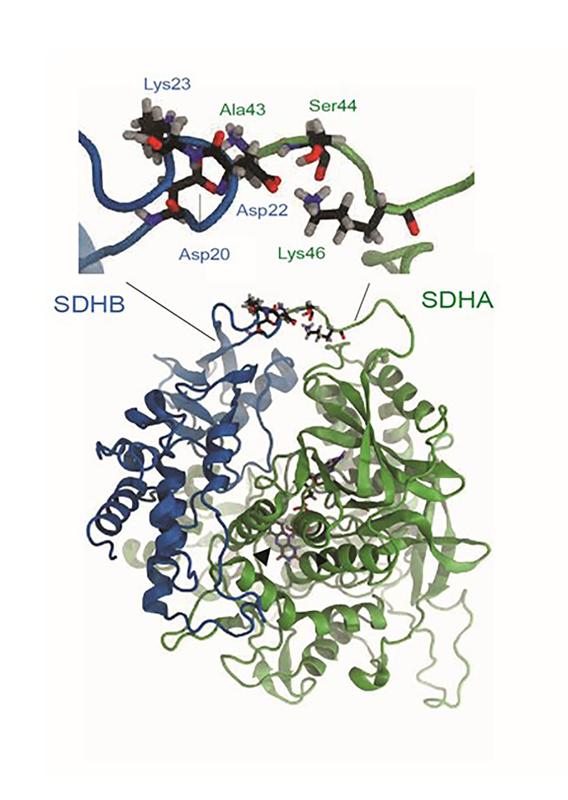Too much of a good thing: overactive immune cells trigger inflammation

Molecular model: A typical interaction between the A45T mutated SDHA gene (green) and the SDHB gene (blue). DBM
The immune system protects us from infections and tumors – a challenging task, not least because harming the body’s own healthy tissue must be avoided at the same time. However, rare genetic diseases lead to defects in the immune system known as primary immunodeficiency disorders (PID).
One consequence of such disorders is susceptibility to infections, yet certain tumors and non-infectious inflammation (autoimmune diseases) can also occur more frequently.
The researchers tested the hypothesis that the metabolic activity in the immune cells of PID patients can serve as a biomarker. They based this on the fact that cellular metabolism is a key regulator of the functioning of immune cells.
In the immune cells of a subset of the examined PID patients, a key metabolic process – cellular respiration – was indeed significantly increased. During cellular respiration, energy is generated in the mitochondria, the “powerhouses of the cell”.
Increased cellular respiration
On the basis of this discovery, the researchers were able to decode a new kind of disease mechanism, from the genetic defect via mitochondria and back to signal transduction to the nucleus.
The increased cellular respiration was triggered by the hyperactivity of a protein in the respiratory chain. This then signaled the cells to produce inflammatory mediators. With these findings, the researchers were able to successfully administer a targeted treatment approved for another indication.
The study was led by Professor Christoph Hess (Department of Biomedicine (DBM) of the University of Basel and University Hospital Basel, and CITIID, University of Cambridge) and Professor Mike Recher (DBM, University of Basel and University Hospital Basel).
“It is an example of how patient-based research can help to decode disease-causing molecular processes,” Christoph Hess says. This benefits patients, who may receive more targeted and effective medication with fewer side effects. Further, insights into fundamental biological processes gained from studying rare diseases can also enable new pathophysiological considerations relating to more common diseases.
Prof. Dr. Christoph Hess, University of Basel, Department of Biomedicine, Immunobiology, phone: +41 61 328 68 30, e-mail: chess@uhbs.ch
Anne-Valérie Burgener, Glenn R. Bantug et al.
SDHA gain-of-function engages inflammatory mitochondrial retrograde signaling via KEAP1–Nrf2
Nature Immunology | DOI 10.1038/s41590-019-0482-2
Media Contact
More Information:
http://www.unibas.chAll latest news from the category: Life Sciences and Chemistry
Articles and reports from the Life Sciences and chemistry area deal with applied and basic research into modern biology, chemistry and human medicine.
Valuable information can be found on a range of life sciences fields including bacteriology, biochemistry, bionics, bioinformatics, biophysics, biotechnology, genetics, geobotany, human biology, marine biology, microbiology, molecular biology, cellular biology, zoology, bioinorganic chemistry, microchemistry and environmental chemistry.
Newest articles

First-of-its-kind study uses remote sensing to monitor plastic debris in rivers and lakes
Remote sensing creates a cost-effective solution to monitoring plastic pollution. A first-of-its-kind study from researchers at the University of Minnesota Twin Cities shows how remote sensing can help monitor and…

Laser-based artificial neuron mimics nerve cell functions at lightning speed
With a processing speed a billion times faster than nature, chip-based laser neuron could help advance AI tasks such as pattern recognition and sequence prediction. Researchers have developed a laser-based…

Optimising the processing of plastic waste
Just one look in the yellow bin reveals a colourful jumble of different types of plastic. However, the purer and more uniform plastic waste is, the easier it is to…



